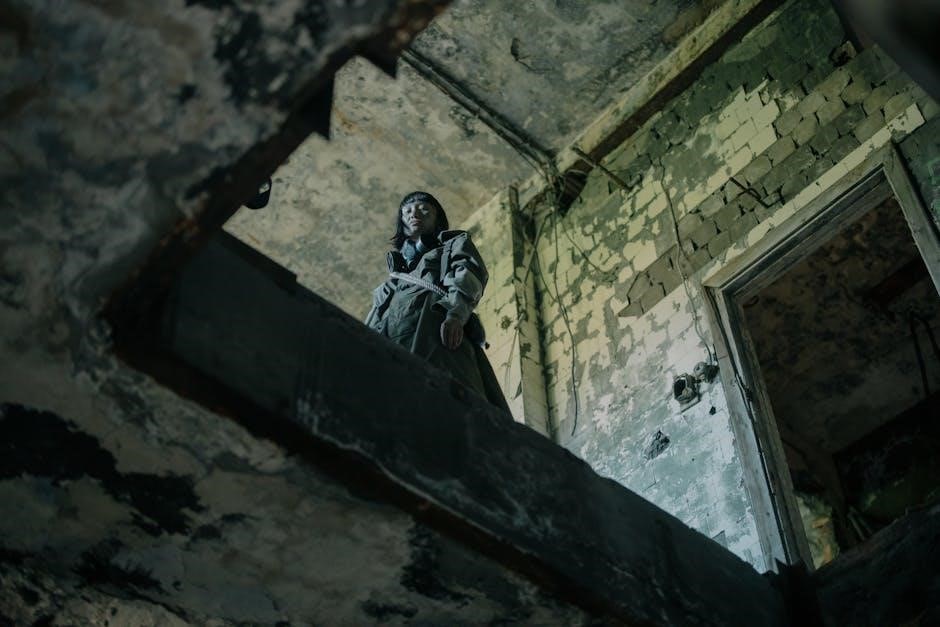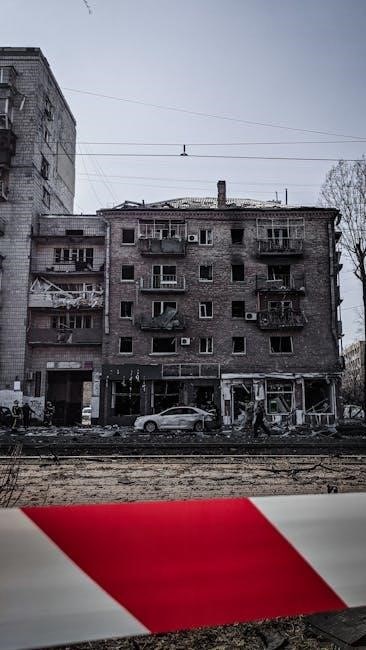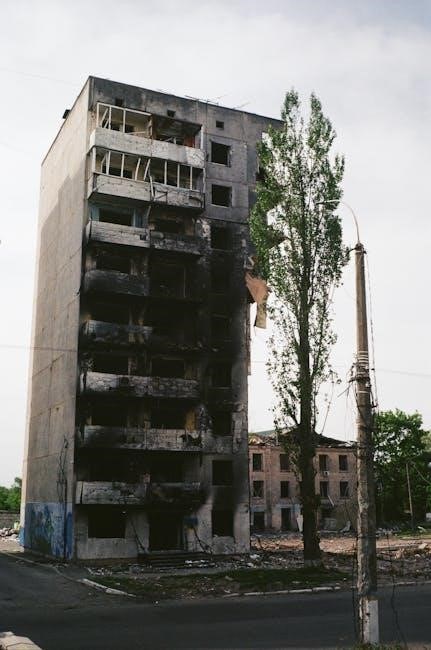Ruined by Lynn Nottage: An Overview
Lynn Nottage’s Ruined, a Pulitzer Prize-winning drama, defies simple labels. Set in the war-torn Democratic Republic of Congo, it explores survival, resilience, and the complex lives of women amidst conflict and brutality.
Synopsis of Ruined
Ruined unfolds in a small mining town within the Democratic Republic of Congo, a place ravaged by a brutal civil war. Mama Nadi, a shrewd businesswoman, runs a bar and brothel, offering refuge to women displaced and damaged by the conflict. Her establishment becomes a fragile haven, a space where government soldiers and rebel forces momentarily coexist, seeking solace and distraction.
The play introduces us to women like Sophie and Salima, each bearing the scars of war, particularly the horrific experience of sexual violence. Christian, a traveling salesman and Mama Nadi’s confidant, brings new women to her establishment. Nottage weaves a narrative of survival, exploring themes of exploitation, resilience, and the search for humanity amidst unimaginable brutality. The play rewrites Mother Courage in the context of war.
Thematic Exploration in Ruined
Ruined delves into the profound impact of war, particularly on the lives of women in the Democratic Republic of Congo. The play unflinchingly explores themes of sexual violence as a weapon of war, highlighting the physical and psychological trauma inflicted upon its victims. It examines the complex dynamics of survival, forcing characters to make difficult choices in a world where morality is often blurred.
Nottage also investigates the themes of resilience, hope, and the enduring power of the human spirit in the face of unspeakable atrocities. The play questions the cost of survival and the possibility of finding love and connection amidst such devastation. Furthermore, it touches upon themes of exploitation, disownment and the complexities of female relationships in times of conflict.

Character Analysis in Ruined
Ruined showcases complex characters navigating a brutal reality. From Mama Nadi’s pragmatism to Sophie’s resilience, each character reveals the multifaceted impact of war on individual lives and relationships.
Mama Nadi’s Role and Complexity
Mama Nadi, the shrewd businesswoman at the heart of Ruined, operates a bar and brothel, offering refuge in a war zone. She is portrayed as a complex character who seeks to maintain order and profitability amidst chaos. Her establishment becomes a haven, albeit an unsavory one, for women seeking survival.
She strives to remain neutral, serving both government soldiers and rebel forces, highlighting her pragmatism. Mama Nadi’s character is not without flaws; her primary goal is survival, sometimes at the expense of those around her. However, she also exhibits moments of compassion and protection, offering a safe space for women scarred by war. Her role is a crucial exploration of survival, morality, and the intricate choices people make in extreme circumstances.
Sophie’s Trauma and Resilience
Sophie, a young woman in Ruined, embodies the devastating impact of war, specifically the brutal act of rape used as a weapon. She represents the “ruined” women, carrying both physical and emotional scars. Despite her trauma, Sophie demonstrates remarkable resilience, seeking to reclaim her life and agency.
Her experiences highlight the play’s central theme of survival. She finds refuge in Mama Nadi’s bar, using her skills to contribute. Sophie’s journey showcases the potential for healing and the enduring strength of the human spirit. She symbolizes hope amidst despair, demonstrating the capacity to find purpose and dignity even after unimaginable suffering. She becomes a symbol of defiance and resilience.

Ruined as a Reflection of the Congo Civil War
Ruined vividly portrays the brutal realities of the Congo Civil War. Nottage exposes the conflict’s devastating impact on civilians, particularly women, highlighting themes of sexual violence, exploitation, and the struggle for survival.
The Impact of War on Women
Lynn Nottage’s Ruined unflinchingly confronts the devastating impact of the Congo Civil War on women. The play illuminates how women become primary targets and victims in armed conflicts, facing unimaginable horrors like rape, torture, and mutilation. Nottage emphasizes that war is a tragedy for civilians, especially women.
Ruined exposes the psychological implications of rape, torture, and the societal shunning that often follows. The narrative reveals how the war strips women of their dignity, security, and sense of self, leaving them to navigate a world forever altered by violence and trauma. The play amplifies the voices of Congolese women, sharing experiences of trauma and resilience.
Rape as a Weapon of War
Ruined directly addresses the horrific reality of rape as a weapon of war in the Democratic Republic of Congo. Nottage’s play portrays the systematic use of sexual violence to terrorize, humiliate, and destroy communities. The play shows us that the bodies of women become battlegrounds, symbols of a conflict that extends far beyond the front lines, as men claim rights to their bodies.
The playwright illustrates how rape is used to inflict lasting physical and emotional damage, shattering families and leaving deep scars on both individual survivors and the social fabric. Ruined serves as a stark reminder of the brutal consequences of war, where women are targeted.

Literary and Dramatic Significance
Ruined holds significant literary and dramatic weight. The play garnered the 2009 Pulitzer Prize for Drama, solidifying its place as a powerful and important contribution to contemporary American theatre.
Pulitzer Prize and Critical Acclaim
Ruined achieved significant recognition, most notably winning the 2009 Pulitzer Prize for Drama. This prestigious award underscored the play’s profound impact and artistic merit. Critics lauded Nottage’s unflinching portrayal of the Congolese civil war and its devastating consequences, especially for women. The play’s exploration of trauma, resilience, and the complexities of human relationships resonated deeply with audiences and reviewers alike.
Reviewers praised Nottage’s ability to weave a compelling narrative that balanced the brutal realities of war with moments of hope and compassion. The play’s powerful performances and evocative staging further contributed to its critical success. Ruined was celebrated for its ability to shed light on a often-overlooked conflict and give voice to marginalized communities.
Nottage’s Rewriting of Mother Courage
Lynn Nottage’s Ruined is often discussed in relation to Bertolt Brecht’s Mother Courage and Her Children. Nottage’s play can be seen as a contemporary reimagining of Brecht’s classic, transplanting the themes of war, survival, and morality to the context of the Democratic Republic of Congo. While Mother Courage explores the impact of the Thirty Years’ War, Ruined focuses on the devastating effects of the Congolese civil war, particularly on women.
Nottage’s Mama Nadi shares similarities with Mother Courage, both are resilient businesswomen navigating war-torn landscapes. However, Nottage’s play offers a more nuanced exploration of female agency and the complexities of survival in the face of extreme violence, moving beyond Brecht’s epic scope to focus on individual stories of trauma and resilience.

Production and Performance Aspects
Productions of Ruined often emphasize the play’s emotional intensity and cultural context. Directorial choices highlight the resilience of the characters and the brutal realities of the Congolese civil war.
Directorial Choices and Interpretations
Directors of Ruined face the challenge of balancing the play’s harsh realities with its moments of hope and resilience. Kate Whoriskey, who directed the world premiere, emphasized the importance of staging the play with authenticity and respect for the experiences of Congolese women. Interpretations often focus on the play’s themes of survival, trauma, and the complex relationships between the characters.
Directorial choices can also highlight the play’s critique of war and its impact on civilians, particularly women. Staging the violence and its aftermath requires sensitivity and a commitment to portraying the human cost of conflict. Ultimately, directors aim to create a powerful and moving theatrical experience that honors the stories of the women in Ruined and raises awareness of the ongoing struggles in the Democratic Republic of Congo.
Music and Dance in Ruined
Music and dance play a crucial role in Ruined, adding layers of meaning and emotional depth to the play’s narrative. Nottage incorporates Congolese music and dance traditions, reflecting the cultural context of the story and providing moments of joy and release amidst the violence. These elements serve as a form of resistance and a celebration of Congolese identity.
The music often underscores the characters’ emotions, conveying their pain, hope, and resilience. Dance sequences can depict both the trauma of war and the characters’ attempts to reclaim their bodies and spirits. The integration of music and dance enhances the play’s theatricality and creates a powerful connection with the audience, immersing them in the world of Mama Nadi’s bar and the lives of the women within it.

